Knowledge Exchange and Technology Transfer
Primed for Impact
2018_%20.png?crc=3873734352)
PDF Version
Past Issues
Vision and Mission
An Extract from
the University’s
Annual Accounts 2018–19
The University Profile
Officers of the University
The Court
Teaching and Learning
Research and Innovation
Knowledge Exchange and
Technology Transfer
Message from the
President and
Vice-Chancellor
E-Book
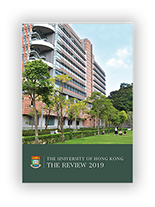

Innovators at the DreamCatchers MedTech Hackathon 2019 developed potential solutions based on the theme ‘Innovation for Crowded Hospitals’.
HKU has led the way in Hong Kong in recognising and promoting knowledge exchange as a part of our core academic mission. In 2019, we continued to record strong results in technology transfer, the incubation of ideas and community engagement. We also welcomed greater government support for our ongoing and expanding efforts to open new pathways to impact.
Over the past decade, the University has embraced knowledge exchange (KE), including technology transfer, as a core academic activity. We reward KE in staff performance appraisals, provide funding support and honours for KE activities, and foster entrepreneurship and innovation through the Technology Transfer Office (TTO). Other local universities have followed our lead and the government has also been taking note. In 2018–19, it announced that funding for KE will rise by 9% from 2019–20, and funding for technology transfer will double to $8 million for the TTO and $8 million for start-ups (the latter awarded through the Technology Start-up Support Scheme for Universities at HKU, TSSSU@HKU). This welcome injection of more funds will no doubt contribute to our ability to achieve impact.
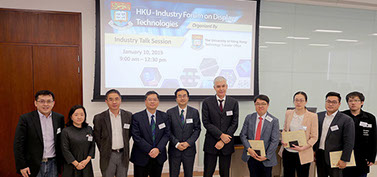
The first HKU-Industry Forum on Display Technologies was held in January 2019. The forum served as a platform for exchanging ideas and fostering deeper connections between HKU and the industry.
The TTO has been a stalwart participant in helping our researchers bring their discoveries beyond academia to industry and other users, through patent filing and licence applications, outreach, and capacity-building. In 2018–19, HKU filed 208 patent applications, 72 of which were granted – bringing our global total of patents since 1998 to 796 (281 in the US). For outreach, we brought HKU inventions to a number of local, regional and international competitions, such as the 47th International Exhibition of Inventions of Geneva in 2019 where our scholars received 10 medals (see Spotlight on Innovators). We also organised gatherings such as the first HKU-Industry Forum on Display Technologies held in January, and we worked closely with local collaborators such as Cyberport and Hong Kong Science Park to provide space and networks for inventors. TTO is also actively engaging with partners in Mainland China.
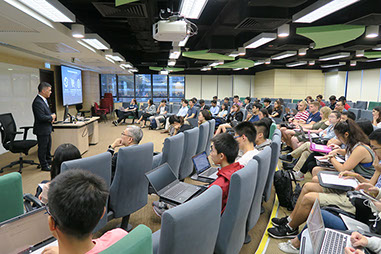
The Faculty of Science has launched a new Entrepreneurship Seminar Series for students, staff and alumni from all faculties to provide extra-curricular training to further equip students and alumni for their business ventures.
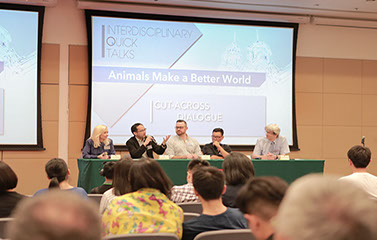
Interdisciplinary Quick Talks aim to promote engagement between disciplines and share evidence-based knowledge on challenging issues from multiple perspectives with the community.
Another place where the University promotes innovation and entrepreneurship is iDendron, HKU’s innovation and entrepreneurship hub, which opened in 2017 to provide collaborative space and support for start-ups and spin-offs by students, staff and alumni. iDendron has been the launch pad for 53 companies to date and has hosted more than 80 educational and networking events for 6,000 participants. Its signature programme is DreamCatchers, which includes a seed fund competition, hackathons and an Entrepreneurship Academy that attracted more than 300 participants to its 10-week programme in 2019. To take things to the next stage, we launched the iDendron Incubation Programme in July 2019 and selected 12 high-potential HKU teams for six months of intensive mentor engagement, market intelligence, support from industry specialists and investors, and more. The success of iDendron has encouraged HKU to develop a strategic plan to further advance innovation, as evidenced by the creation of the new post of Chief Innovation Officer. Individual faculties are also fostering a start-up culture on campus, with the Faculty of Science launching a new minor in entrepreneurship that is co-taught with the Faculty of Business and Economics and other faculties.
KE activities are also encouraged and supported across all faculties in the University, not just those involving science and technology. Our KE Impact Project Funding Scheme supported 74 proposals from across the University in 2018–19. We also launched a new round of the Interdisciplinary KE Project Fund in 2019 to encourage collaboration between scholars in different faculties, which awarded $2 million in total to 16 proposals. Interdisciplinarity is also the focus of a new initiative, the Quick Talks series, which bring together academics from different disciplines for public talks on challenging issues and launched in February with a forum on open data.
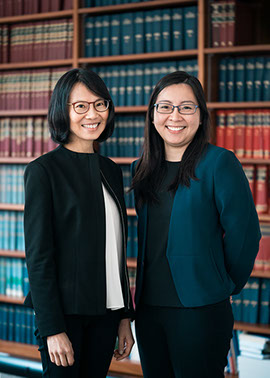
The research led by Professor Lusina Ho (left) and Ms Rebecca Lee (right) in the Faculty of Law has directly led to the setting up of a Special Needs Trust in Hong Kong.
72
patents
granted in 2018–19, bringing the total since 1998 to 796.
Open data and access to information are primary goals of the University’s KE strategy. We have a moral responsibility to engage the public in what we are doing and to use that knowledge to inform public debate. The HKU Scholars Hub provides access to our scholarly output and received more than seven million view counts from outside HKU in 2018–19. The University also organised more than 1,000 public events, such as lectures, workshops, exhibitions and performances. We are trying to instil values of openness and transparency in research postgraduate students, too, by asking them to deposit their new datasets for inspection and by encouraging them to hone their communication skills through the Three Minute Thesis and the Visualise Your Thesis competitions, the latter of which was formally launched in 2019, following a pilot in 2018. The emphasis on open access has also been embraced, at our urging, by the Research Grants Council, which has agreed that in the coming Research Assessment Exercise (RAE), submitted impact cases will be in the public domain.
The RAE is expected to confirm the high quality of many of our KE activities, such as the Special Needs Trust for parents or caregivers of individuals with cognitive impairment that was adopted by the Hong Kong government following a proposal by HKU law academics. Changes like this demonstrate how academic research can address unmet needs, be transformative and benefit society. They are inspiring HKU’s staff and students to reach out and make positive changes in the community. They are also inspiring community organisations to seek out our expertise and support us. The examples on the following pages demonstrate our commitment to community impact across all of our disciplines.
53
start-ups
launched through iDendron since it opened in 2017.
74
KE projects
supported by the KE Impact Project Funding Scheme in 2018–19. Another 16 proposals were supported through the Interdisciplinary KE Project Fund.